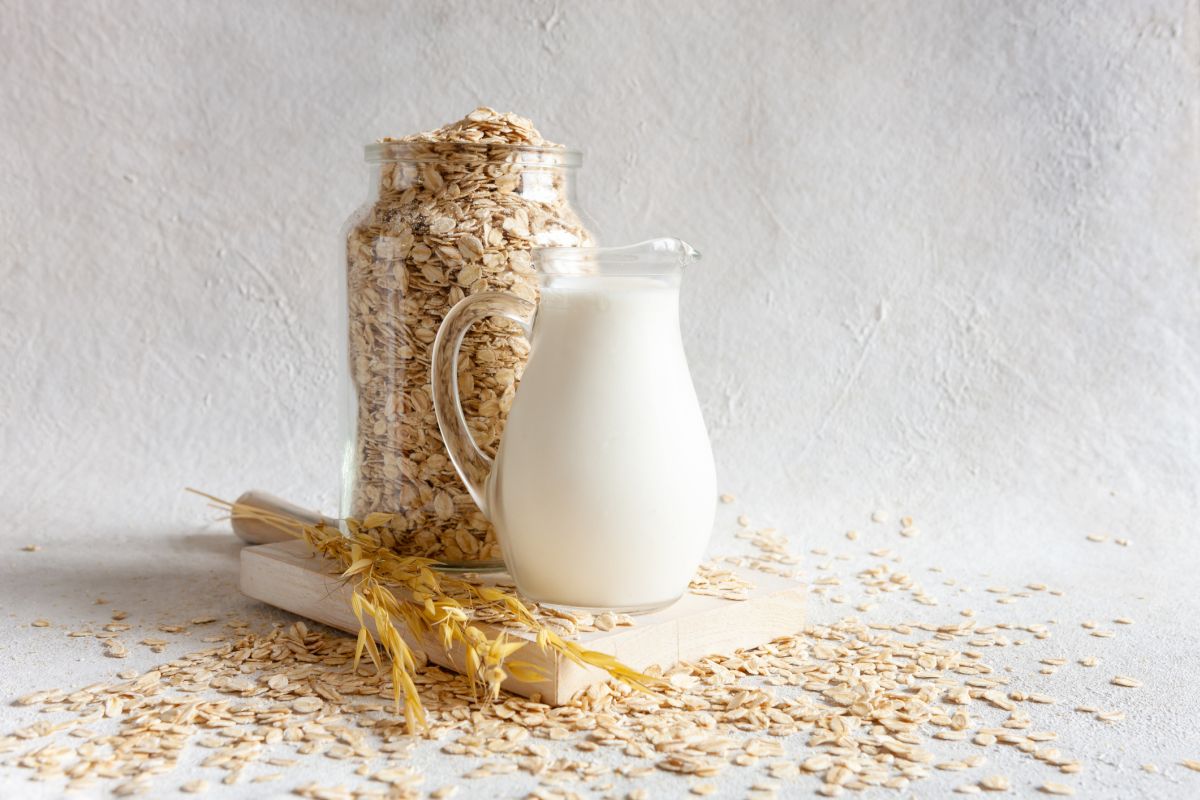Oat milk is an excellent choice for anyone who wants a nutritious alternative to dairy milk that also tastes good. This type of milk is perfect for people with dairy allergies or lactose intolerance or those following a vegan diet. It has a creamy texture and a sweet flavor. And many people prefer the taste of oat milk to other non-dairy milks like almond milk.

What Is Oat Milk?
Oat milk is a non-dairy, plant-based alternative to cow’s milk that has gained popularity in recent years. It is lactose free, dairy-free, and vegan, which makes it appealing to those with food allergies or dietary restrictions.
Oat milk is made by soaking oats in water, blending the mixture, and straining it to remove the solids. Several brands of oat milk are available at most grocery stores, which makes it easy to enjoy oat milk any time.
You can also make your own oat milk at home. Making oat milk at home allows you to control exactly what goes into it. You can have peace of mind that the product is made with safe and high-quality ingredients.
Some people enjoy oat milk as is, while others add sweeteners, flavorings, or spices like vanilla extract or cinnamon. Oat milk is also tasty in coffee, lattes, or other hot drinks and in recipes.
Oat Milk Nutrition Facts
According to the USDA, one cup of oat milk has the following nutrition. But always check the nutrition label of any product you are buying for its specific nutrition information.
- Calories in oat milk
One cup of oat milk has 120 calories, which is a little more than low-fat (1%) cow's milk with 105 calories.
- Carbs in oat milk
There are 16 grams of carbohydrates in oat milk. Two grams of those carbs are dietary fiber. Low-fat cow's milk has 13 grams of carbohydrates but doesn't have any fiber.
- Protein in oat milk
Each cup of oat milk has 3 grams of protein, which is less than half of the amount of protein in low-fat cow's milk (8 grams).
- Fat in oat milk
One cup of oat milk has 5 grams of fat with 0.5 grams of saturated fat. Low-fat cow's milk has 2 grams of fat with 1 gram of saturated fat.
Benefits of Oat Milk
There are numerous benefits of oat milk. Milk is a major source of calcium and vitamin D for most people, but some nondairy milks are not a good source of calcium and vitamin D. But each cup of fortified oat milk has 350 mg of calcium and 144 IU of vitamin D. This is a little more than low-fat cow's milk that has 307 mg of calcium and 107 IU of vitamin D in one cup.
Fortified oat milk is also high in B vitamins like riboflavin and B12. It provides fiber that is often low in typical American diets. Having fiber is a benefit of oat milk over cow's milk.
Oat meal contains no nuts, dairy, or lactose, so it is a great option for people with lactose intolerance or a nut allergy. While oats and oat milk are gluten-free, people with Celiac disease should still buy oat milk that is marked as certified gluten-free.
Oat Milk FAQs
Yes, oat milk is good for you. It is low in calories and fat and contains protein, fiber, and several essential vitamins and minerals. Make sure to buy unsweetened oat milk so you don't increase your intake of added sugars.
Yes, oat milk is dairy-free and plant-based. It is ideal for people with lactose intolerance or an allergy to dairy.
Store-bought oat milk is usually fortified with calcium. If fortified, it has as much or more calcium than cow's milk. If you make your own oat milk at home, it will not have calcium.
Yes, oat milk is vegan because it is made with oats soaked in water. Store-bought oat milk is often fortified with vitamins and minerals, but it is still vegan and vegetarian-friendly.
Bottom Line
If you are looking for a nutritious milk alternative, oat milk is a great option. It is low in calories and fat, and it contains protein, fiber, vitamins, and minerals. You can enjoy oat milk on its own or added to coffee, lattes, smoothies, or other recipes. However you choose to enjoy oat milk, it is a delicious and healthy choice that offers many benefits for your wellness.


